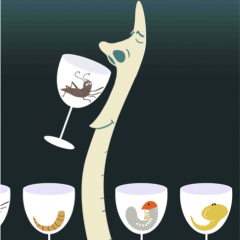Pakeeza and Ogadinma just published a paper in the Journal of Lipid Research. The paper shows that if arachidonic acid (AA) is injected into the fly, it stimulates production of twenty-carbon polyunsaturated fatty acids (PUFAs), also known as eicosanoids. They also showed that both linoleic acid (LA) and AA stimulate the fly immune response when D. melanogaster is exposed to a heat-killed bacterial pathogen. This work identifies PUFAs that are involved in insect immunity and adds evidence to the notion that Drosophila utilizes immunostimulatory lipid signaling to mitigate bacterial infections.
Author: admin
63rd Annual Society of Nematologists Meeting
The Dillman was well-represented at the Society of Nematologists (SON) annual meeting in Park City this year. Perla Achi presented her work on cardenolides and entomopathogenic nematodes (EPNs). Kyle Anesko competed in the student competition and talked about his work on nematode proteins and immunity. Anil Baniya gave a talk on several different EPN genomes and organized the EPN symposium at the meeting this year. Lanie Bavier presented a poster on EPNs infecting milkweed bugs. And Dr. Dillman gave an overview of the lab’s work at the conference. One highlight was the incredible artwork that Tom Powers’ lab had displayed in the lobby at the conference.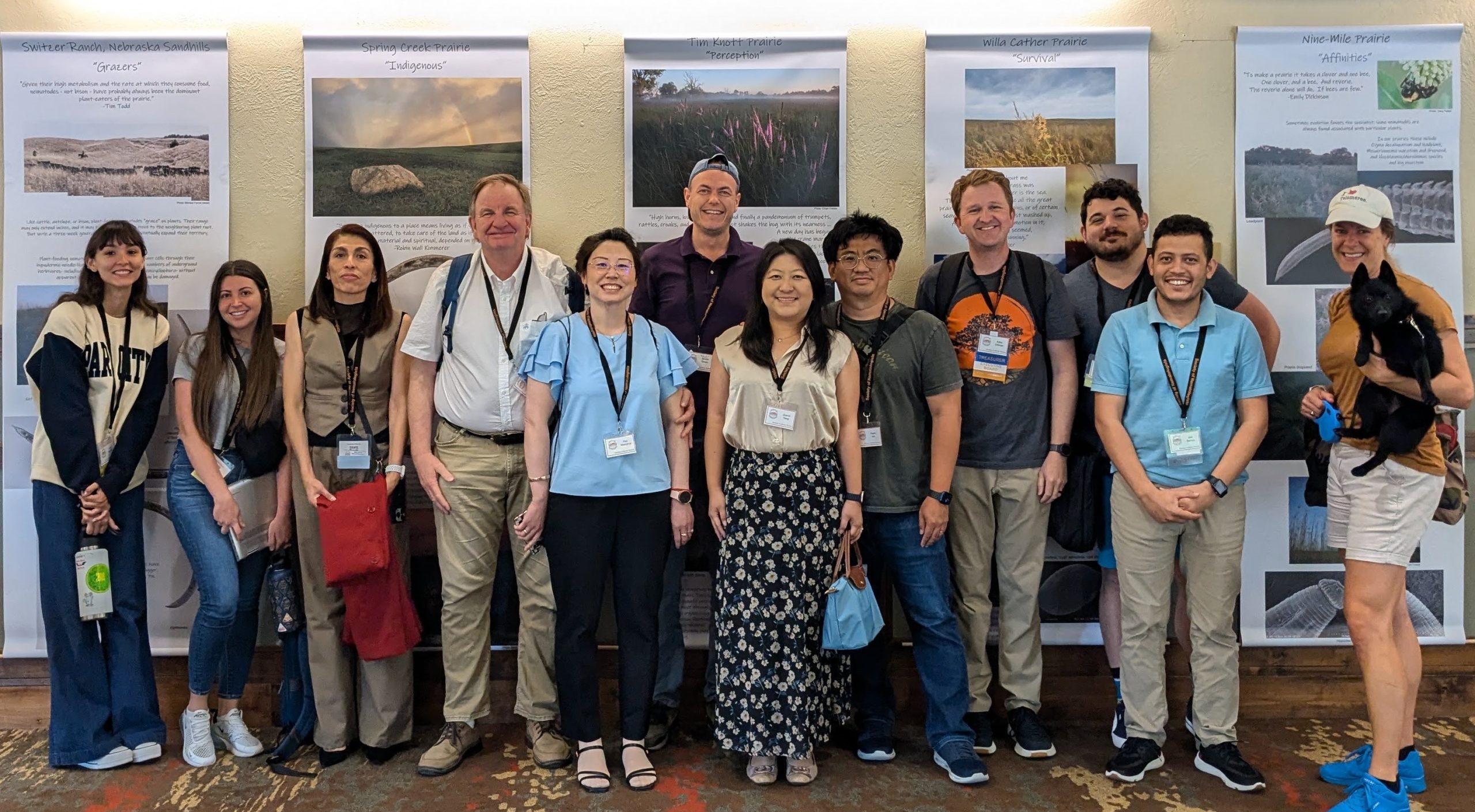 UCR attendees at the conference: (from left to right): Lanie Bavier, Perla Achi, Damaris Godinez-Vidal, Andreas Westphal, Fen Westphal, Simon “Niels” Groen, Jiue-in Yang, Chia-Jui “Frank” Hu, Adler Dillman, Kyle Anesko, Anil Baniya, & Sophie Zaaijer.
UCR attendees at the conference: (from left to right): Lanie Bavier, Perla Achi, Damaris Godinez-Vidal, Andreas Westphal, Fen Westphal, Simon “Niels” Groen, Jiue-in Yang, Chia-Jui “Frank” Hu, Adler Dillman, Kyle Anesko, Anil Baniya, & Sophie Zaaijer.
Aklima Lima Graduates!
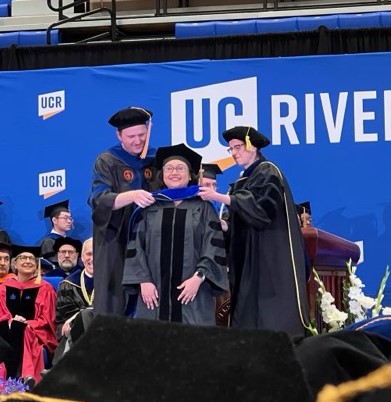 Aklima Lima received her PhD in Biochemistry this last Saturday. She has done some nice work detailing the role of ShK-domain-containing proteins in the host-parasite interactions of Steinernema carpocapsae. She published her first paper on this topic in 2022 and has two manuscripts that she is currently working on, detailing the rest of her thesis work. Congratulations Aklima!!
Aklima Lima received her PhD in Biochemistry this last Saturday. She has done some nice work detailing the role of ShK-domain-containing proteins in the host-parasite interactions of Steinernema carpocapsae. She published her first paper on this topic in 2022 and has two manuscripts that she is currently working on, detailing the rest of her thesis work. Congratulations Aklima!!
Podcast on Indestructible Nematodes
Dr. Dillman recently had the pleasure of being interviewed for the podcast Constant Wonder. This podcast explores the delight found in science, art, history, and nature, and the first episode of season eight examines nematodes as indestructible creatures found all over the world, even in the most inhospitable of environments.
Dr. Dillman was interviewed with his undergraduate advisor and mentor, Dr. Byron Adams, and the two shared their love of nematodes and the research they do. They discuss everything from how they came into this field of research, to finding nematodes in Antarctica, to the idea that society may be too clean and we may need nematodes to help us fight certain diseases. The hosts also interviewed Dr. Michael Werner, a primary researcher at the University of Utah who recently discovered nematodes living in the Great Salt Lake.
It’s a great episode, and if you’d like to listen to it, you can find it here.
Local California Veterinarians Now Testing for Canine Shistosomiasis
Our lab was recently contacted by a local veterinarian to inform us that, thanks to our discovery of canine shistosomiasis in the Colorado River, she was able to positively identify the parasite in one of her canine patients.
The dog had initially come to her office earlier this year with general symptoms of lethargy, lack of appetite, vomiting, and diarrhea. The veterinarian did routine blood work and parasite screening, and everything came back negative. They treated the dog with palliative care. However, the dog did not really improve.
In March, the dog’s owner saw our lab’s work on canine shistosomiasis featured in the LA Times and made the connection that they had visited the Colorado River before the dog started getting sick. The vet immediately ran the test for the parasite and discovered high amounts of the parasite present in the dog. The vet has started the dog on the appropriate medications and hopes she’ll make a full recovery.
We love seeing the practical effects of scientific research, and we hope other dogs and pets may be helped from our discovery. If you have a pet that has been affected by canine shistosomiasis from the Colorado River, we’d love to hear from you! You can contact us by emailing Dr. Dillman.
Deadly Dog Parasite Discovered in the Colorado River
Our lab recently discovered a parasite lurking in the southern half of the Colorado River that could be deadly to dogs and other animals. We were first contacted by a veterinarian in the Los Angeles County Health Department in January 2023 because several vets in the area were starting to report that dogs they had treated seemed to be sick with canine shistosomiasis. At least one dog had even died before the sickness could be identified. As the veterinarians questioned the dog owners, it seemed that many of the dogs had been in contact with the Colorado River. Canine shistosomiasis is caused by a parasite, so the Los Angeles County Department of Public Health reached out to us to see if we could provide any information that could be useful.
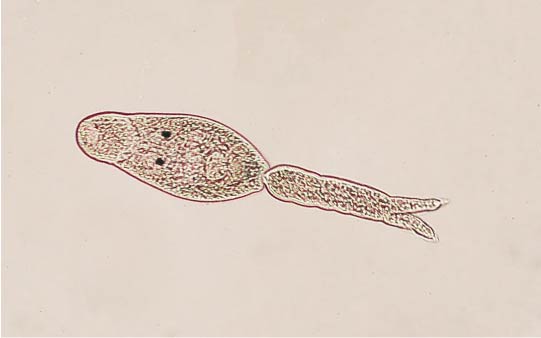
Our lab identified a possible location along the Colorado River where the parasite could be hiding, so we visited the shores of the Colorado in Blythe, California, several times and collected hundreds of snails. Snails are known to be vectors of canine shistosomiasis. (A vector is a host that carries a disease from one individual to the next.) If we could find the parasite in the snail, then we could confirm that this parasite was indeed in the Colorado River.
After months of collecting snails and testing, we finally discovered that not only was there one snail species that carried canine shistosomiasis, but there were actually two different snail species in the Colorado River in Blythe carrying this disease.
Canine shistosomiasis is mostly harmless to humans. It can cause a rash that’s commonly known as “swimmer’s itch.” This rash usually clears up on its own after a few days because the parasite can’t actually survive in humans. However, this same parasite can infect dogs and other animals, like raccoons and even horses. And it thrives in these animals, causing sickness and potentially even death if left untreated. It’s a tricky parasite, though, because it can sit dormant in the animal for months before making itself known. By this time, most dog owners or horse owners may not associate their trip to the Colorado River with their pet’s new sickness. Vets in the area also may not know to test for this disease.
Our hope is that we can inform the public of the dangers of visiting the Colorado River right now with pets and animals. If you do visit the river and your pet later becomes sick, make sure your vet tests for canine shistosomiasis.
Our work has recently been featured in the following news articles: NBC Los Angeles, Gizmodo, LA Times, and KYMA of Yuma, Arizona.
Dog Parasite Discovered in California
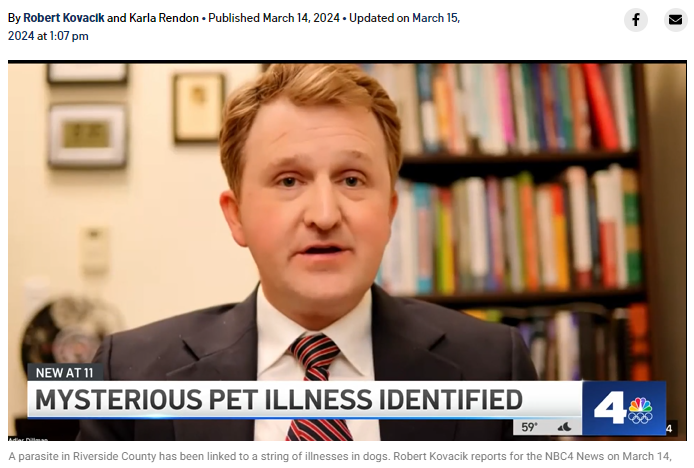
After being recruited by local veterinarians to help find the source of a parasitic infection in southern California, we identified two species of snails, Galba cubensis and G. humilis in the Colorado River in California. We also identified that some of those snails were indeed carrying Heterobilharzia americana, the fluke that causes canine schistosomiasis. Our finding is the first report of the presence of this flatworm parasite in Southern California.
New Entomopathogenic Nematode, Steinernema adamsi, Described
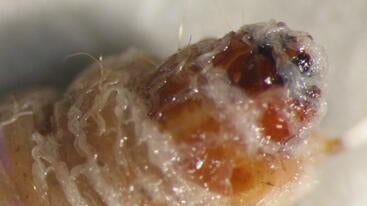 We have characterized a new species of entomopathogenic nematode (EPN). This EPN was isolated from Thailand and falls within the Longicaudatum clade, being closely related to Steinernema hermaphroditum. The nematode was named after Dr. Byron Adams, who was Dr. Dillman’s undergraduate mentor and who introduced Dr. Dillman to EPNs in 2003. Steinernema adamsi is the newest EPN to be described and has much to teach us about how nematodes parasitize insects. It may also be useful in biological control. A UCR press release has additional information.
We have characterized a new species of entomopathogenic nematode (EPN). This EPN was isolated from Thailand and falls within the Longicaudatum clade, being closely related to Steinernema hermaphroditum. The nematode was named after Dr. Byron Adams, who was Dr. Dillman’s undergraduate mentor and who introduced Dr. Dillman to EPNs in 2003. Steinernema adamsi is the newest EPN to be described and has much to teach us about how nematodes parasitize insects. It may also be useful in biological control. A UCR press release has additional information.
Podcast on Brain Worms
Dr. Dillman was a guest on a podcast for the very first time. It was an episode of Something Offbeat and the podcast episode dropped today. The episode was based on a recent article detailing a case of Ophidascaris robertsi infection in a human brain.
Nematode Parasite of Pythons Found in Woman’s Brain
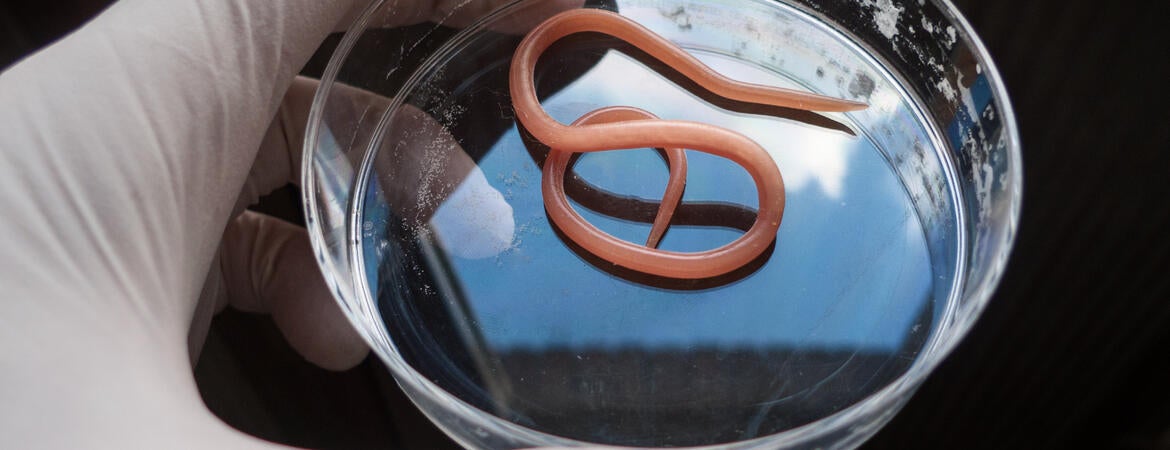
A recent case of Ophidascaris robertsi infecting a human brain was recently reported. This is a parasite of snakes, not normally found in mammals. This recent case is the first reported infection in humans. UCR nematologists discuss the case and help provide some context to this infection.
